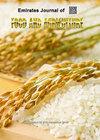盐胁迫下叶面施用谷氨酸优化萝卜生长效果
IF 0.7
4区 农林科学
Q3 AGRONOMY
引用次数: 0
摘要
盐度被认为是一个令人痛苦的非生物因素,主要通过损害植物细胞机制来破坏作物质量和产量。由于离子积累,盐度胁迫导致生长速率和吸水率降低。这个问题正在通过使用几种植物生长调节剂来解决。植物生长调节剂已被证明可以提高植物抵御压力的能力。在本研究中,为了评估外源应用的植物生长调节剂谷氨酸(GA)(10mM)的功能,对芜菁(紫顶品种)进行四种不同水平的盐(0、4、8和12dS/m)以及一种水平的赤霉酸处理。结果表明,盐胁迫减缓了植株的生长,降低了萝卜叶片中叶绿素的含量。单独应用盐导致生物化学特性显著下降。然而,在盐胁迫条件下,外源GA提高了萝卜叶片的抗氧化活性、叶绿素含量和植株生长。此外,研究结果表明,在盐胁迫下,维生素C降低;外源性GA可提高Vit。萝卜中的C。此外,施用GA显著降低了萝卜根和叶对盐分的吸收。此外,在盐胁迫下;GA显著控制了萝卜中酚类化合物的含量。关键词:甘蓝型油菜,盐度,谷氨酸,形态生化测定,还原糖和非还原糖本文章由计算机程序翻译,如有差异,请以英文原文为准。
Optimizing efficacy of turnip growth through foliar application of glutamic acid under saline conditions
Salinity is assumed to be a distressing abiotic factor that mainly disrupts crop quality and yield by impairing plant cell mechanisms. Due to ion accumulation, salinity stress results in lowering growth rate and water uptake. This issue is being solved by the use of several plant growth regulators. Plant growth regulators have been proven to increase plants' ability to withstand against stress. In this study, turnip (purple top cultivar) was subjected to four distinct levels of salt (0, 4, 8, and 12 dS/m), as well as one level of gibberellic acid, in order to assess the function of exogenously applied plant growth regulator glutamic acid (GA) (10 mM). Results revealed that salt stress slowed plant growth and decreased the amount of chlorophyll in turnip leaves. Application of salt alone resulted in a considerable decline in biochemical characteristics. However, in salt-stressed conditions, exogenous application of GA improved the antioxidant activity, chlorophyll contents and plant growth in the turnip leaves. Moreover, results depict that under salt stress vitamin C decreased; however, exogenous application of GA enhanced the Vit. C in turnip plants. Further, the uptake of salt content in turnip roots and leaves was significantly lowered by the application of GA. Additionally, under salt stress; GA dramatically controlled the quantity of phenolic compounds in turnip.
Keywords: Brassica rapa, Salinity, Glutamic acid, Morphological and biochemical assay, Reducing and non-reducing sugar
求助全文
通过发布文献求助,成功后即可免费获取论文全文。
去求助
来源期刊

Emirates Journal of Food and Agriculture
AGRONOMYFOOD SCIENCE & TECHNOLOGY&nb-FOOD SCIENCE & TECHNOLOGY
CiteScore
1.80
自引率
0.00%
发文量
18
期刊介绍:
The "Emirates Journal of Food and Agriculture [EJFA]" is a unique, peer-reviewed Journal of Food and Agriculture publishing basic and applied research articles in the field of agricultural and food sciences by the College of Food and Agriculture, United Arab Emirates University, United Arab Emirates.
 求助内容:
求助内容: 应助结果提醒方式:
应助结果提醒方式:


